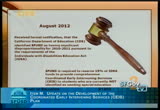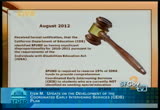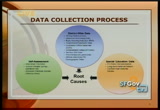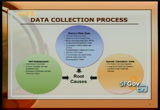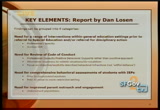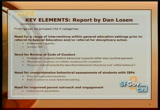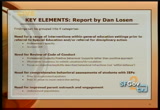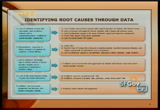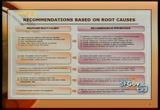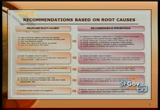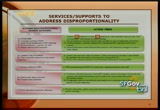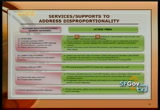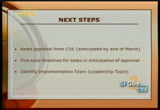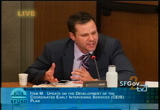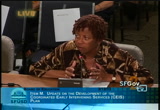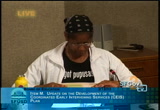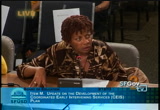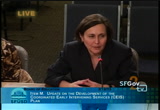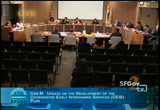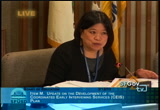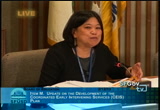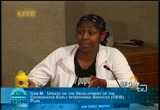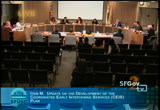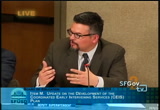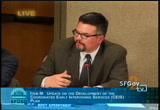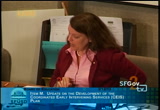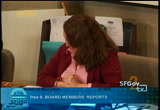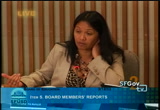tv [untitled] March 12, 2013 10:00pm-10:30pm PDT
10:00 pm
safe coordinated already intervening services plan which was dressed and not identified as special education students. so i just wan if -- want to reiterate that the funds are going to general education, not special education. >> do you have a [inaudible] question about the dollar amount is? . it translates roughly into 1.8 million. the state does provide us with technical assistance through the process [inaudible] have
10:01 pm
been attending since september. once the plan is approved, rather than general education [inaudible] will be participating in this process as well. we have been having -- we were required to put together a stake holder group and also a leadership group which is really just a [inaudible] is to meet regularly to help us through the process from beginning to end and that has been happening since september in october we brought on dan, the author of one or our review checklist that we used for our [inaudible] to consult with us for analyzing the root cause for [inaudible] and in october we also brought on board doctor brown who is here with us today
10:02 pm
as a consultant of the safe plan. doctor brown is a member of the state [inaudible] that works on significant disproportion ality. the day that election process took us a while. the self assess /-pl piece is required by the state and it basically included a number of surveys that we used. the wisconsin check /h*eus is one of three recommended by the state and it was a survey administered to focus groups at 16 schools on various issues from what they thought professional capacity was at the schools, to attitudes towards inclusive practices, attitudes towards students of
10:03 pm
underserved populations. we happen to have [inaudible] part of that so we had data from those surveys as well around inclusive practices and around attitudes towards supporting behavior of /staoupbtds within the general education seting. we also provide edd with district wide data that we worked with the rpa department to /aeu /kwaeur including early indicator data, counselor office referrals, achievement data and also demographic data around our student population. and the third prong with special education data -- we have an ed panel that we have talked about before where every psychologist who is assess ing
10:04 pm
ing a subject is required to bring the case to an ed panel and go through a review process before making a determination. we also looked across the [inaudible] pattern across the district. no one school or psychologist stood out so there were no clear patterns that emerged from there. and then for this year we looked at all the referrals that came in, particularly for african american students and looked for pat /erpbs -- patterns there as well. we put this together and his findings can be grouped into four categories overall. the first one being clearly a need for special
10:05 pm
education funding before we get to special education action. the four he indicated here were -- section 504 would address the needs of students within the general education setting without the need to go all the way to special education. looking at having a less punitive approach in reacting to discipline /-rb shoes, - within categories that
10:06 pm
are more subjective ive in nature versus something that is more clear such as bringing a gun to school. this is specific for students who already have ieps that the lack of behavior in assessments and supports for these students leads to [inaudible] maybe if we enhance our behavioral approaches within those settings for those students with ieps we can prevent that from happening. and finally the need for parent outreach. and over [inaudible] we just
10:07 pm
had a discussion about this databased decision making. in three ways, one our capacity to access data related to behavior or discipline -- the waiver now and finally the data that we do have we're not using adequately to -- or consistently to make decisions around how we address behavior issues or how we plan programs this might support children's needs in the behavior and emotional arena. this next slide is a little difficult to read, but if you look at your handout on the left side it lists evidence that he put together through all of his review of the data we submitted and on the right it's his inferences of lewd cause out of those evidence
10:08 pm
based on data. one of which was lack of [inaudible] process as we just talked about and on the right lewd cause is [inaudible] general education for students with behavior issues, lack of resources for the teachers, professional capacity of the teachers. he stressed the need for incorporating the need for multicultural and awareness within all the other interventions we might think of using. the 504 system as we talked about the code of conduct and such and the review of previous slide. based on
10:09 pm
the [inaudible] implementing intervention. and reviewing the code of conduct training staff and using alternative responses in terms of deescalation techniques. training or school psychologists in central office, /perbl education in behavior support plans, how to formulate them and implement them effectively, adopting data systems or updating our data systems particular write with review to day that and discipline. and then looking at this data [inaudible] on a regular basis to drive our decision making. and finally of course educating parents on what is available to them and what niche tiff and interventions are being implemented ed district wide
10:10 pm
that they can [inaudible]. this provides an operationalized chart and we recommended -- we already had in anticipation of this, unfortunately we were found to be disproportional last yore and in an attempt to address that we had started an initiative of the rbi behavior [inaudible] and we are looking at more specificically using that particularly to address the needs at our high school level. looking at social and emotional curriculum being made available to all our sites to implement at the k 8 level providing sites with behavior coaches, rp coaches, reviewing section 504 structure,
10:11 pm
implementing change to make it more are bust, looking at the code of conduct, developing an education code for the 13, 14 school year. we have provided cpi training that focuses on verbal deescalation techniques already, but we will look to continue that through next year and going forward. [inaudible] support plan training this year and all psychologists and central special education staff were trained and we are looking at how to maintain this going forward for any new staff, perhaps putting in place a trainer and making sure any new staff is trained as well. recommendations around data systems -- synergy is coming
10:12 pm
next year and they do have a good discipline model. and they also recommending that we purchase some sort of data system to track students [inaudible] meetings and interventions that have happened prior to students being referred for special education assessment and then hooking further to analyze this data on a regular basis. we've put this all together in a plan that has been submitted to cde and we are referring to it as a
10:13 pm
draft because we have to wait approval from them before we can go forward and we are hoping that we get their approval become -- by the end of march. in the men time we do have to fine tune some of the tine lines, such as who's going to be responsible for which of the tasks proposed and the time /haoeupbs around them and finally we are required to identify an implementation team, also to be composed of general education and special education members and this would be a team that would be recommended by the current leadership team. that is a snap sot shot of the safe plan that we have submitted and does
10:14 pm
anybody have questions? >> any questions or comments from board members? >> thank you for the presentation. it's very helpful. so in the comment about the fact that many of our suspensions that take place are for willful defiance, around the conversation of alternatives to suspensions, is there a possibility that we could either acquire more specificity for the actual reasons for the suspension because i know there have been a lot of efforts at the state level to try to push back on the use of that. is there anything we can do to ensure more specificity when using that object i.
10:15 pm
-- objective. >> thinkthe plan is to look at the policy as a whole and it would definitely be an opportunity for us to implement that into this policy. >> fortunately, some of the efforts of arguization i belong to such as the state [inaudible] services was very helpful for advocating for a package that came into effect for january 1 [inaudible] item k. there was a study in orange county when they looked at all of the suspensions for that area and they found that the most probably disprate
10:16 pm
inconsistent description of behaviors was for item k in all of orange county and is that gave the data to push the legislation. so what this means is that school districts are already working in regards to looking at what those preinterventions will need to be documented in the actual -- your suspension forms. and this goes with synergy in that that will be a part of discipline packet. >> any other questions. /stkpwr >> i just wanted to ask because it seems like so many of our families are a welt of knowledge that we haven't been able to tap, i believe that there are a few entities
10:17 pm
outreach to families across the district and gather information to them. do you have some thoughts and ideas on that so i know it's just not words on a page? >> that is a part of the plan and detail where all of the it'll be a two way street in regards to communication in that we'll have steak holders or representatives from all those organizations but i'm
10:19 pm
>> this is not something i have an expertise in but i know families are struggling and when they talk to me how they can't make it through f fusc and it's been going on for years and it's da, bill at debilitating so i'm hoping we can find a way to improve on that greatly. >> so this is -- i know that a lot of times we ask for it and they have to run it for me, but i think we are /khrebging more data that is more race
10:20 pm
specific. so therefore i'm thinking about -- i think i discussed this with you two, but just for other commissioners, we really need to look at what is happening specifically to our african american students that is maybe different than what is happening to students of other races so i mentioned that we have a lot of movement with african american students within our district. i would like to know is that something that's just unique to african american population or is it something -- what kind of negative effect does that have and why are they moving? what are the things that are happening specifically to our black students? and i think that in order to target this
10:21 pm
population, we need to really understand who we're serving so some of it is this cultural stuff that we have here. the second is that we just don't know. like, we have not asked ourselves or looked at it specifically and we just don't know. like, we don't have all the data on these students and what -- we don't really know who we're serving, you know. we just know there's -- we look at achievement, we look at disproportionalty, but in order to change it, we have to know how to change it and what we can do. do we even know what kind of supports we really need? this is what's
10:22 pm
happening, you know. and i think this is a really -- too bad we gotta get [inaudible] in order for us to sort of investigate this, but i think it's telling us what we knew for years and i'm really glad that our district is finally doing something about it. >> can i just add on something there? and i guess my real question is you have black only focus groups? i think that's the call of the day? right? where you happen to say this this is such a significant issue, we have groups of families and -- you're trying to create this space for people to come. be courageous and not be afraid to tell somebody you can't come to this meeting 'cause it's very specific and we're trying to right an awful
10:23 pm
wrong. >> in terms of the group that i work with and in terms of the technical consul substantiates with the state, one of the platforms we're use edd to try to get the disenfranchised students and families is the student voice and i've participated in a forrum with the school board and parents and they had an ongoing dialogue in a very comfortable setting with the psychological board so they could see how their journey was in terms of getting through that school system. >> any other comments or questions? thank you. it's a really important topic. i'm sure we'll get further updates from you when we hear back from
10:24 pm
the state which we don't know when that will be, but in a few weeks sounds like. deputy superintendent. >> so hopefully tonight what you are just a few of the highlights which really just submits some building blocks for us. so while it didn't call out student mobility as a factor, it could be. what we wanna ensure regardless of where any student /hrapb, that across all of our schools they're going to find a research based social emotional program, more robust and accurate data systems that we don't currently have, and when we're noticing that there are challenges or a readiness to learn, factors that we have
10:25 pm
very strategic step-by-step ways of approaching and resolving the resolution. so this represents a lot of really important work i think we need to do to take things to the next level. we've gun some of that work in raising awareness around some of our communities around what it means to take approach in regards to how we program our schools to address this issue and it's gonna fake a little bit of time and you see some elements that were called out here in providing that guidance to staff, whether it's through behavior coaches or adding additional [inaudible] around implementing the tiered support system for our students and all of those efforts are going to include that cultural awareness lens so those biases are being dealt with. and i think it's a good point that all of these pieces
10:26 pm
are a tall order. >> thank you very much for the presentation. i did wanna take one moment. we have one of our new supervisors in the audience. she's been with us a few months so... >> all right. moving right along we now are on item n, consent [inaudible] tonight, i'm o /sroets on the consent calendar. moved and seconded under section f roll call.
10:27 pm
>> [inaudible] consent calendar severed for discussion. there are none. we have [inaudible] plan for school year 20 /sp13, 2014, may i hear a motion pl board members report standing committees we heard from the buildings and ground committee on the action item and really the informational item too. if
10:28 pm
there's anything you wanna add. report from the city and school district select committee commissioner mendoza. >> we have a presentation by our staff on the middle school ifa and [inaudible] hill and had parent comment during public comment where they presented some ideas of /thaeufr for us to con -- consider. we have 22 schoolyards across the district in the city that are currently open and we indicate that each school that par pates is getting 1000 dollars as well as an activity fund that they'll be able to access and two annual cleanings every year so that was really great for us to share and we need to be
10:29 pm
85 Views
IN COLLECTIONS
SFGTV2: San Francisco Government Television Television Archive
Television Archive  Television Archive News Search Service
Television Archive News Search Service 
Uploaded by TV Archive on

 Live Music Archive
Live Music Archive Librivox Free Audio
Librivox Free Audio Metropolitan Museum
Metropolitan Museum Cleveland Museum of Art
Cleveland Museum of Art Internet Arcade
Internet Arcade Console Living Room
Console Living Room Books to Borrow
Books to Borrow Open Library
Open Library TV News
TV News Understanding 9/11
Understanding 9/11